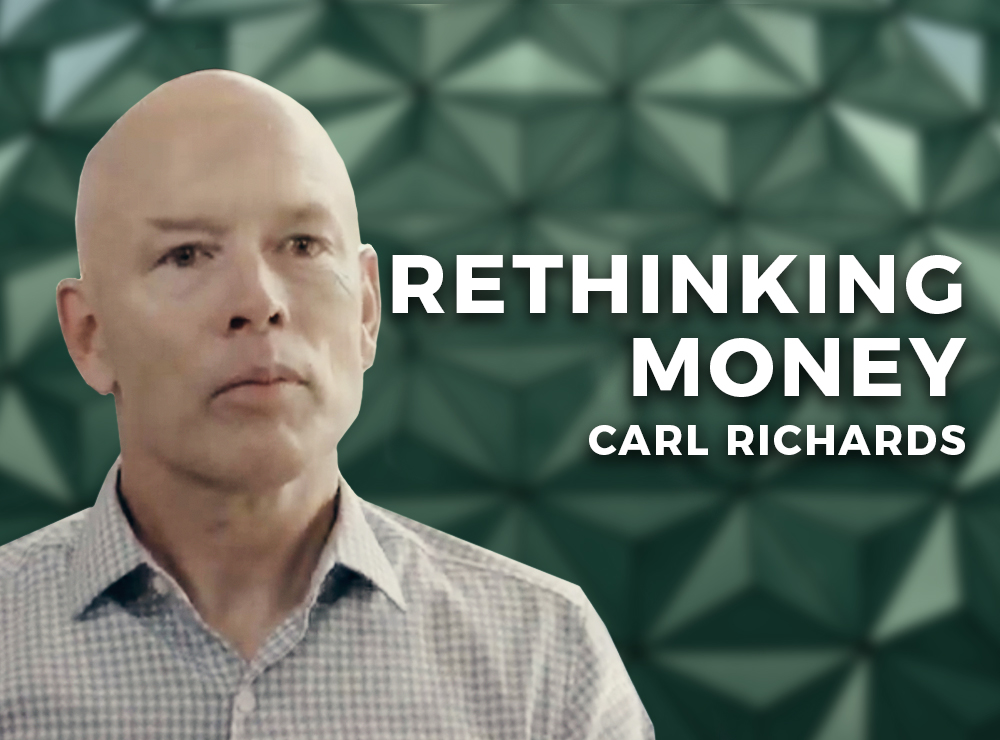
We’ve written in the past about the value of having a very brief financial plan. And when we say brief, we mean a plan that can fit on a single sheet of A4 or even an index card. Someone who very much shares our view on the one-page plan is the behavioural finance expert CARL RICHARDS. In this, the latest part in our series Rethinking Money, Carl explains how to go about writing one.
TEBI: What is a one-page plan, and what is the value of having one?
CR: Most people, as soon as the phrase financial plan is mentioned, think of a think two-inch-thick door stop that’s going to sit on the shelf.
We think it’s going to painful to produce because we’ve got to think everything through. “What are my utility bills going to be like 17-and-a-half years from now?”
There’s a false sense of precision that goes into making this thing. We think it’s supposed to be the perfect representation of the next 30 years of our lives. But that’s a myth!
Going through the one-page plan process helps you shift your mind into this idea that it’s about setting a course and having tools to course-correct.
So it’s about plotting the general direction of travel rather than the precise route?
Financial planning — and, I would submit to you, business planning as well — is way more about being less wrong tomorrow than it is about being right today.
So, if you’re using a financial planner or are doing this on you own, you need to say, “Let’s make a guess, and then we’ll move towards that guess. We know the guess is wrong, so just relax on the guess.”
We don’t have to know exactly what our utility bills will be. Just guess, and take a step forward. New information will become available, and when that information becomes available, reassess your plan.
So I think of a one-page plan as just a reality-based financial plan.
How do you go about writing a one-page plan?
In my mind, there’s a million different versions of them out there now. My version is: you start with a statement of financial purpose. I would point to Simon Sinek’s work about starting with Why?.
If you need some help to get you started, if you’re trying to think about why you’re doing these things, have a conversation with a spouse, a friend or a financial adviser — whoever you trust to guide you.
On the top of our plan it says: “Time with our family, mainly outside, and serving the community.” That’s why we’re doing all these other things.
So the statement of purpose is there to remind you. Those things change and morph over the years, but they tend to be more steady. More bedrock. More anchor.
Then, based on that, move down to, What are your goals? I want you to think of goals as guesses. Just relax. Humans don’t like to be asked what their goals are, so just guess. Just think about three years from now.
If anybody doubts that goals are guesses, simply go back to January of 2020 and look at what you had as your goals for 2020. It was a guess. We’ve all learned this. It’s been a very dramatic example, but it’s something that’s always been true.
So guess on some goals, and rank those goals in order of priority.
Then the bottom section of a one-page plan is: What do the next 90 days look like? What am I going to do to move towards those goals in the next 90 days?
There are obvious advantages to a one-page plan: it’s brief, it’s simple and it’s memorable. But surely there’s a place for detailed planning too? Where does that come in?
One thing that’s important to understand is that my emphasis on a one-page plan does not discount the value of detailed planning.
Of course, we’re going to have to dive in deep. For example, you might need some life insurance. The decision might be relatively simple if you’re buying the kind of insurance I think everybody should buy — that’s basic term insurance — but there might be many pages of documentation. Of course.
Your investment portfolio, depending on the complexity of your needs and how many different accounts and plans you have, might require a thick document. And the justification for how you decided on the investment process you’re employing might need another thick document.
The one-page plan sits on top of all that stuff. So yes, this stuff is important, it’s going to help you fall asleep at night, it’s really valuable, and it’s some of the most important work a financial adviser does. But it’s no good if we don’t have a way to remind ourselves of the basics.
So the one-page plan sits on top. You could call it an executive summary if you want.
Also in this series:
The key to controlling our spending
Don’t judge people based on money
WHAT NEXT?
If you found this article interesting, you might want to try these:
Four financial priorities for young adults
Good investing is like good winemaking
NEED AN ADVISER?
If you need a financial adviser, we may be able to help.
Wherever you are in the world, we will try to put you in contact with an adviser in your area whom we know personally, who shares our evidence-based investment philosophy and who we feel is best able to help you. If we don’t know of anyone suitable we will tell you.
We’re charging advisers a small fee for each successful referral, which will help to fund future content.
For compliance reasons, this service is currently unavailable to readers in the US.
Click here and let’s get started.
© The Evidence-Based Investor MMXX









